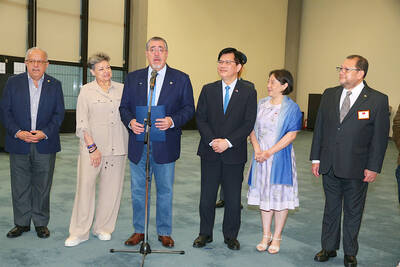The Constitutional Court on Friday upheld the constitutionality of legal provisions used to punish people who have changed their household registration to vote where they did not live, work or study.
The grand justices found the three provisions under Article 146 of the Criminal Code to be constitutional, because what constitutes illegality is clearly defined and does not infringe on people’s rights to equality, vote and move freely as enshrined in the Constitution.
The punishment is also proportional, Chief Justice Hsu Tzong-li (許宗力) said.

Photo: Wu Cheng-feng, Taipei Times
Article 146 states that a person who illegally intervenes in voting or falsifies voting results, fraudulently changes their household registration to be eligible to vote in a different constituency or attempts to commit such offenses, faces up to five years in prison.
Taiwan’s voting laws are tethered to the household registration system, whereby citizens have to register their primary abode with the government. Eligible voters then have to cast their ballot at a polling booth in an electoral district where they have been registered for a minimum of four consecutive months prior to an election.
Twenty people found guilty of offenses under the article in five elections that took place from 2006 to 2018 asked the grand justices to rule on the constitutionality of the provisions, citing the constitutional right to vote and freedom to choose a residence, among other reasons.
One of the 20, a resident of then-Taipei County (now New Taipei City), surnamed Hu (胡), registered as living in Hualien in February 2006, enabling him to cast a ballot for his uncle who was running for village warden in June that year. He moved his household registration back to Taipei County after the election, and was chargedwith voting interference.
The Hualien District Court sentenced Hu to two months in jail, which could be converted to a fine and one year of deprivation of civil rights. The ruling was later upheld by the High Court in the final verdict.
In another case, Liu Huei-tsung (劉惠宗) and the other two members of China Airlines’ labor union were found guilty of moving their household registrations in Taipei to Taoyuan in July 2018, so that they could vote for their colleague in the Taoyuan mayoral election in November that year.
They each received a three-month sentence, which could be converted to a fine, two-years probation and deprivation of civil rights for one year. The Supreme Court upheld that ruling.
Despite ruling in favor of the constitutionality of Article 146, which the trio were found to have breached, the Constitutional Court ordered a retrial at the Supreme Court, saying that it failed to take into account that the union members had commuted to work in Taoyuan for 20 to 30 years, despite all living in Taipei.
Taiwanese can choose their place of residence or work for household registration, and given that the three union members met the four-month threshold to vote in the Taoyuan mayoral election after they registered households in the city, the Supreme Court’s ruling was tantamount to an infringement of their right to vote, the Constitutional Court said.

Greenpeace yesterday said that it is to appeal a decision last month by the Taipei High Administrative Court to dismiss its 2021 lawsuit against the Ministry of Economic Affairs over “loose” regulations governing major corporate electricity consumers. The climate-related lawsuit — the first of its kind in Taiwan — sought to require the government to enforce higher green energy thresholds on major corporations to reduce emissions in light of climate change and an uptick in extreme weather. The suit, filed by Greenpeace East Asia, the Environmental Jurists Association and four individual plaintiffs, was dismissed on May 8 following four years of litigation. The

A former officer in China’s People’s Liberation Army (PLA) who witnessed the aftermath of the 1989 Tiananmen Square massacre has warned that Taiwan could face a similar fate if China attempts to unify the country by force. Li Xiaoming (李曉明), who was deployed to Beijing as a junior officer during the crackdown, said Taiwanese people should study the massacre carefully, because it offers a glimpse of what Beijing is willing to do to suppress dissent. “What happened in Tiananmen Square could happen in Taiwan too,” Li told CNA in a May 22 interview, ahead of the massacre’s 36th anniversary. “If Taiwanese students or

STAY AWAY: An official said people should avoid disturbing snakes, as most do not actively attack humans, but would react defensively if threatened Taitung County authorities yesterday urged the public to stay vigilant and avoid disturbing snakes in the wild, following five reported snakebite cases in the county so far this year. Taitung County Fire Department secretary Lin Chien-cheng (林建誠) said two of the cases were in Donghe Township (東河) and involved the Taiwan habus, one person was bit by a Chinese pit viper near the South Link Railway and the remaining two were caused by unidentified snakes. He advised residents near fields to be cautious of snakes hiding in shady indoor areas, especially when entering or leaving their homes at night. In case of a

DIPLOMACY: It is Guatemalan President Bernardo Arevalo’s first visit to Taiwan since he took office last year, while Eswatini’s foreign minister is also paying a visit A delegation led by Guatemalan President Bernardo Arevalo arrived in Taiwan yesterday afternoon and is to visit President William Lai (賴清德) today. The delegation arrived at Taiwan Taoyuan International Airport at 4:55pm, and was greeted by Minister of Foreign Affairs Lin Chia-lung (林佳龍). It is Arevalo’s first trip to Taiwan since he took office last year, and following the visit, he is to travel to Japan to celebrate the 90th anniversary of diplomatic relations between the two countries. Arevalo said at the airport that he is very glad to make the visit to Taiwan, adding that he brings an important message of responsibility